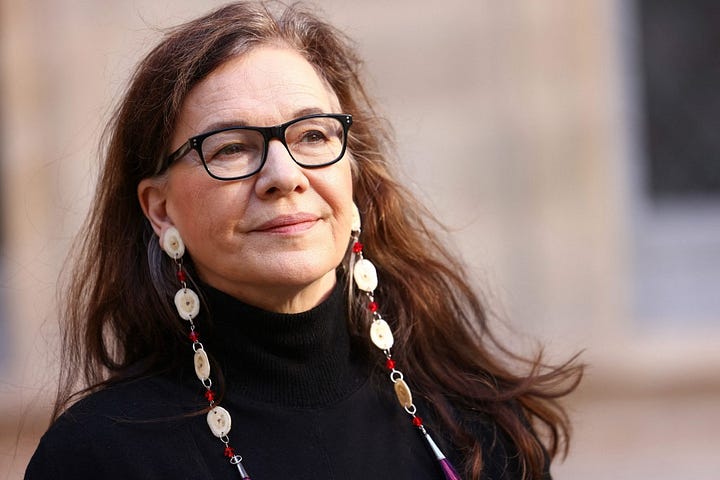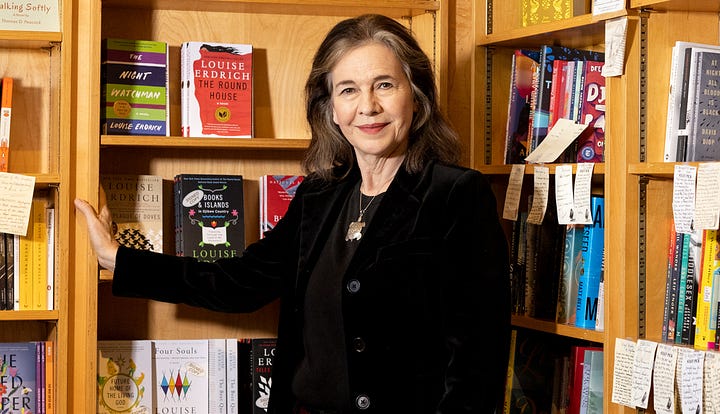Louise Erdrich, Winner of the 2021 Pulitzer Prize In Literature
Versatile Native American Author


Karen Louise Erdrich was born June 7, 1954 in Little Falls, Minnesota. The oldest of 7 children, her father is German-American, and her mother is Chippewa (half Ojibwe and half French). She is a member of the Turtle Mountain Band of Chippewa Indians of North Dakota, a federally recognized Ojibwe tribe.
Erdrich won the 2021 Pulitzer Prize for Fiction for her novel "The Night Watchman" (2020) about a campaign to defeat the 'termination bill' (https://en.wikipedia.org/wiki/Indian_termination_policy introduced by Senator Arthur Vivian Watkins). She has said her grandfather's life inspired the novel. Her maternal grandfather, Patrick Gourneau, was the tribal chairman for the federally recognized tribe of Turtle Mountain Band of Chippewa Indians.
Lauded as a leading writer of the second wave of the Native American Renaissance, Louise Erdrich has thus far published 28 books.
Her novel "The Plague of Doves" (2009) was short listed for the Pulitzer Prize for Fiction and won an Anisfield-Wolf Book Award. She then won a National Book Award for Fiction for "The Round House" (2012), and the Library of Congress Prize for American Fiction at the National Book Festival in 2015.
Her novel "The Master Butchers Singing Club" (2003) was a finalist for the National Book Award. Set in small town North Dakota, is an exploration of her German ancestry and includes stories of WWI.
Her children's book "The Birchbark House" (1999) was a National Book Award finalist.
Louise Erdrich's body of work contains echoes of American great William Faulker, particularly his "Yoknapatawpha" novels, an interwoven series of novels that feature multiple narratives and intertwine local history with current themes.Education & Personal Life
When she was a child, her father paid her a nickel for every story she wrote. Two of her sisters are also writers.
Both of Erdrich's parents taught at a Bureau of Indian Affair boarding school in North Dakota. Although she did not grow up on a reservation, she often visited relatives there.
She has said she grew up "with all the accepted truths" of Catholicism.
Louise Erdrich has an M.A. in Writing from Johns Hopkins University and a B.A. in English from Dartmouth College, class of 1976, the first class of women ever admitted to the college.
Her first year at Dartmouth, she met Michael Dorris, author, anthropologist, writer, and director at the time of the new Native American Studies program. While taking his class, she began researching her ancestry and writing about it.
They collaborated on several short stories before marrying in 1981, and have said that they discussed and mapped out all their books together.
She adopted the 3 children he had adopted as a single man (the oldest had fetal alcohol syndrome and was killed crossing the street) and had 3 more children of their own. But the couple separated in 1995, the same year their only living adopted son accused Dorris of abuse. They divorced in 1996, and Dorris took his own life in 1997 while under investigation for sexually abusing their three daughters. In a final insult, Dorris left his former wife and two living adopted children out of his will.
In 2001, Erdrich gave birth at age 47 to a daughter. She writes about it in the non-fiction book "Books and Islands in Ojibwe Country" (2003), using the name "Tobasonakwut" to refer to the father, a healer she has declined to identify publicly.
When asked if she feels writing is a lonely life, Erdrich replied, "Strangely, I think it is. I am surrounded by an abundance of family and friends and yet I am alone with the writing. And that is perfect."
Her Literary Start
In 1979, Erdrich wrote an intriguing story called "The World's Greatest Fisherman." At her husband's prompting, she entered it into the Nelson Algren Short Fiction competition in 1982 and won the $5,000 prize. It became the first chapter of her debut novel "Love Medicine" (1984), winner of that year's National Book Critics Circle Award. It is the only debut novel ever to win this award.
Erdrich recalls, "I was nearly broke and driving a car with bald tires. My mother knitted my sweaters, and all else I bought at thrift stores ... The recognition dazzled me. Later, I became friends with Studs Terkel and Kay Boyle, the judges, toward whom I carry a lifelong gratitude. This prize made an immense difference in my life."
She later turned "Love Medicine" into a tetralogy (a group of 4 related literary or operatic works) that includes "The Beet Queen" (1986), "Tracks" (1988), and "The Bingo Palace" (1994), set in the 80s at the start of the casino craze. Mostly set before WWII, the series makes use of Native archetypes like the trickster figure, early clashes with the Catholic Church, and multiple narrators.
It was at this time that Louise Erdrich indulged in writing her first poetry collection, "Jacklight" (1984), which incorporates Ojibwe myths and legends, a celebration of kinship ties, and wrestles with differences between Native and non-Native cultures.
Louise Erdrich owns Birchbark Books in Minneapolis, a small "teaching bookstore" that hosts literary readings and other educational events. She and her sister founded Wiigwaas Press, a small nonprofit publishing company.Louise Erdrich’s Awards (incomplete list)
1983 Pushcart Prize in Poetry
1984 National Book Critics Circle Award for Fiction, for Love Medicine
1984 Sue Kaufman Prize for Best First Novel, for Love Medicine
1984 Virginia McCormick Scully Literary Award for Best Book of 1984 dealing with Indians or Chicanos
1985 Los Angeles Times Book Prize
1985 Guggenheim Fellowship in Creative Arts
1987 O. Henry Award, for the short story "Fleur" (published in Esquire, August 1986)
1999 World Fantasy Award, for The Antelope Wife
2000 Lifetime Achievement Award from the Native Writers' Circle of the Americas
2006 Scott O'Dell Award for Historical Fiction, for the children's book "The Game of Silence"
2007 Honorary Doctorate from the University of North Dakota; refused by Erdrich because of her opposition to the university's North Dakota Fighting Sioux mascot[60]
2013 Rough Rider Award
2014 PEN/Saul Bellow Award for Achievement in American Fiction
2016 National Book Critics Circle Award for Fiction, for LaRose
2021 Pulitzer Prize for Fiction, for The Night Watchman
2022 Berresford Prize for significant contributions to the advancement and care of artists in society
2023 Prix Femina étranger Award for The Stranger in French translation
Tips on Writing Historical Fiction
·I have always thought historical fiction is the most difficult genre because you need to get every detail right for the time period. But if you are in love with a period in history and find yourself researching it anyway, your book will almost certainly have…





